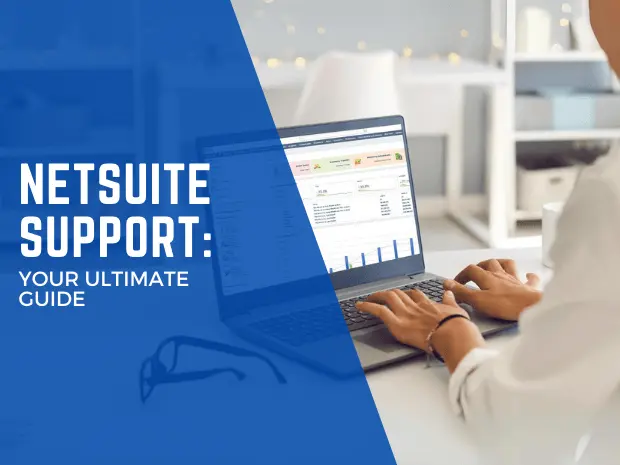
5 things to look for in your partner to make the most of your NetSuite ERP software.
If you are reading this article, then you have probably already made up your mind to switch to NetSuite. Or, at the very least, you are probably considering it very seriously. Either way, the natural next step is to rope in a great NetSuite Partner. This is where many businesses end up making a choice that they later regret.
A NetSuite Partner wears many hats, like:
- identifying your needs accurately,
- developing the project scope based on your specifications,
- giving you a clear idea of the total cost of ownership,
- ensuring secure migration of all your data to NetSuite,
- performing the implementation process along with customization, and finally,
- facilitating go-live and providing post-launch support like training and troubleshooting.
Therefore, it goes without saying that onboarding the right NetSuite Partner is extremely critical to the success of your transition to NetSuite. But, what factors come into play when deciding on a prospective partner? In this blog, we shed light on the 5 most important things to look for when choosing a NetSuite Partner that fits the bill for your business.
Let’s begin!
#1 Basic Business Background
No, we are not just talking about introductory things like the name of the business, location, profiles of key people at the top, and so on. While these are important details to get started with, you can always delve a little deeper into their business basics.
For example, how many people are there on the team? What are their roles? Additionally, it’s a good idea to dig deeper into the profiles of resources who will be working on your NetSuite project. For example, how many years of collective and individual NetSuite experience do they possess? How many NetSuite projects has the company handled? What is the methodology used by them for different kinds of NetSuite projects?
Are all their developers and engineering resources in-house? Who makes all the important decisions? Who interfaces with the client? Will you have a dedicated account manager? Who will be your point of contact throughout the project?
These details will help you to get to know them much better right in the beginning. For example, having all resources in-house is usually advantageous since it reduces communication time and chances of miscommunication. Similarly, having a smaller but experienced firm as your NetSuite Partner can often turn out to be more advantageous than going with a large one.
Various resources on the internet can help you validate the credibility of prospective NetSuite Partners and arrive at a shortlist of potential NetSuite Partners for your business. These include the Unofficial NetSuite Community on Reddit where you can have direct, meaningful interactions, and the “NetSuite Professionals” message board which provides crucial information on NetSuite Partners across the world.
Lastly, an early indicator to watch out for is their interest in your business. It’s crucial to see how deeply they want to understand all facets of your business and the various process areas. A good NetSuite Partner will take their time to understand every inch of your business thoroughly before making his sales pitch.
#2 Values, Philosophy, and Approach
Switching to NetSuite is hardly touch-and-go. It is an intensive process. You will likely be working closely with your NetSuite Partner for at least 6 months, if not more. Furthermore, most NetSuite projects are complex and messy with unforeseen and unavoidable circumstances arising often. You need a partner who has your back at all times, and you need to be able to trust them with your money, data, and resources.
Needless to say, joining hands with a partner who does not value honesty, transparency, and empathy can turn out to be a nightmare. Hence, a little bit of conversation and probing can give you a better idea of what kind of people you are dealing with.
Be clear from the beginning that you are not looking for “yes-men” – i.e. people who initially agree to everything you ask for only to fail at a later stage. Stress the importance of being able to deliver on their commitments and ask as many questions as you want. You can even ask questions based on hypothetical scenarios like “What if this happens?” or “What if that happens?”
Take your time. Don’t rush the process of getting a sense of their values, and only proceed when you can see a clear alignment between their work ethic and your own philosophy. Here at BA Software, for example, you are most likely to experience our commitment to empathy, authenticity, success, and transparency right from day one. We spend a great deal of time understanding the minutest details about your business and mapping your underlying ERP needs. Only then do we work our way up from there. We keep you involved in every aspect of the project making sure that there are no surprises along the way that throw you off track.
#3 Technical, Functional, and Industry Understanding
Once the basic alignment is established in points #1 and #2, the rest of the screening process is pretty straightforward. Start by getting a pulse of their experience and exposure and test their understanding at three primary levels–technical, functional, and industry.
The technical aspect has mostly to do with the software and its nitty-gritty. Over and above the basic NetSuite knowledge, look for specialized knowledge in technical aspects like managing integrations, doing customizations from scratch, solving development challenges, and ensuring smooth user experience.
In the functional aspect, the key thing to look for is their understanding of various business processes and how well they can translate real-world challenges into NetSuite functionality.
Finally, make sure that they have relevant exposure to your industry since that will make it easier for both you and your NetSuite Partner to reach your shared goals sooner.
An important factor that will affect what you are looking for in a partner is the kind of in-house NetSuite resources you already have, if any. For example, do you have one or more people in your Accounting or IT departments who have either been a part of a NetSuite project in the past or have used NetSuite enough to know about the inherent complexities and challenges? Having even one such team member can be a huge plus for you and impact your decision-making about the NetSuite partner you finally choose to go ahead with.
Similarly, consider another simple yet overlooked dimension–complexity. How complex is your NetSuite project? If your business is a stand-alone, single entity with pretty much standard processes, less than 10 users, and requires no out-of-the-box features or customizations, then your NetSuite project is going to be a relatively simpler one.
A project with medium complexity would usually mean that your business comprises one or more related entities. There are moderately complex business processes that might require simple customizations and add-on features or modules. The number of users would be more than 10 but less than 100.
A highly complex NetSuite project would entail multiple entities across multiple geographies, currencies, and languages. Complex customizations, integrations, and add-ons would be a necessity in most cases, and the number of users would be well over 100.
#4 Reviews, References, and Certifications
Did you know? Oracle (the company that owns NetSuite) offers various certifications to NetSuite partners to indicate their expertise, experience, and customer service capabilities. But even if a potential partner hasn’t received any certification yet, you can still perform the appropriate due diligence by asking for client references and checking for reviews and testimonials online.
Cross-checking claims externally from a third party is a good way to ensure that your potential NetSuite Partner actually walks the talk and is not just saying things just for the heck of it. For first-hand customer experiences, ratings, and reviews, explore trusted platforms like G2Crowd and Clutch.co, or ask for direct references from the NetSuite Partner.
#5 Cost and Scope of Implementation
Last but not least, compare and contrast the project scope document and the cost quotation that you receive from your top 2 or 3 choices.
The more detailed the scope, the less you have to worry about. Study the assumptions, contingencies, and provisions in-depth so that there are no surprises along the way. If a project scope document promises you everything including the sun and the moon, take it with a pinch of salt. Meanwhile, keep an eye out for post-go-live support and training support, and see if these components find adequate space and attention in the scope.
Similarly, the project quote must have detailed cost breakdowns, contingency costs, cost-related assumptions, any potential changes in the cost down the line, and a clear payment plan. Ideally, a significant portion of the payment structure should be milestone-based to ensure accountability from both parties.
There you go–we hope we were able to clear the air when it comes to zeroing in on the right NetSuite partner! If you have any questions or comments about this blog or wish to explore BA Software as a potential NetSuite Partner for your business, please feel free to get in touch with us.
“Even if we do not talk about 5G (specifically), the security talent in general in the country is very sparse at the moment. We need to get more (security) professionals in the system”




The potential uses for Chat GPT-3 are endless, and it has the potential to revolutionize the way we interact with computers and machines.